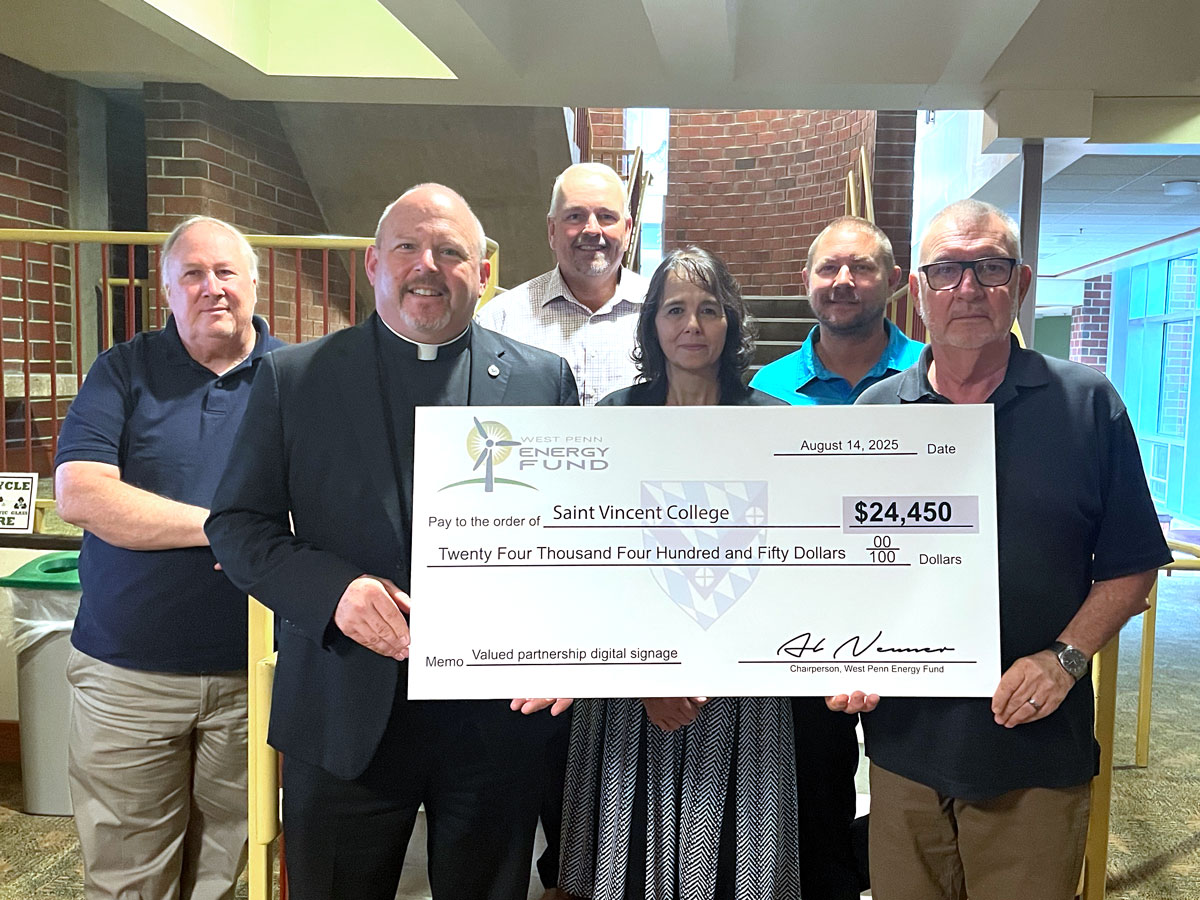Saint Vincent College in mid-August received a $24,450 grant from the West Penn Energy Fund (WPEF) to support the design and installation of digital signage systems in strategic campus locations to acknowledge the College’s longstanding partnership with the WPEF.
“Saint Vincent is grateful to the WPEF and its leadership for this generous grant and for our deeply valued partnership that has extended over many years,” said Father Paul Taylor, O.S.B., C’87, S’91, president of Saint Vincent College. “This project will serve to memorialize our longstanding collaboration with WPEF and strengthen our shared commitment to environmental sustainability for the benefit of current and future generations.”
The project—Promoting Sustainable and Efficient Energy Use in Partnership with the West Penn Energy Fund—features signs that will: document SVC’s commitment to energy sustainability, promote the College’s use of renewable energy sources and encourage comprehensive adoption of sustainable technologies, illuminate energy conservation and the potential impact of individual behavior on the environment, highlight cost savings in recent building projects on campus, and announce sustainability programming and events.
Saint Vincent and WPEF leaders hope the digital signage systems will lead to an increase in campus and community engagement in sustainable initiatives while also contributing to positive economic and environmental benefits for West Penn Power ratepayers and the region.
Driven by a shared commitment to renewable energy sources, energy conservation and efficiency, and the responsible use of natural resources, the partnership has paid off in dividends for SVC.
“The WPEF has been a catalyst for Saint Vincent’s adoption of alternative energy technologies, the integration of energy efficient building systems and structures, and a renewed focus on energy conservation and environmental stewardship throughout campus,” said Father Paul.
Guided by the Benedictine hallmark of stewardship for the natural environment and the College’s WPEF association, SVC has demonstrated its commitment to environmental sustainability in various initiatives:
“We are very proud of our long-term partnership with Saint Vincent College,” said Joel Morrison, WPEF fund administrator. “Over the years, we have helped on several prominent projects on campus, including the installation of a 20 kW solar PV system on the Sis and Herman Dupré Science Pavilion; the expansion and renovation of the Dale P. Latimer Library with the integration of advanced energy-efficient building technologies; the installation of a SmartFlower, a solar photovoltaic system to power an electric vehicle charging station; and the installation of induction cooktops in several buildings to demonstrate this emerging technology.”
“This newest grant for digital signage throughout the College will be used to teach others of the College’s commitment to sustainability and the partnership with the West Penn Energy Fund,” Morrison added.
The WPEF provided guidance, technical expertise and generous grant funding to support many campus initiatives to help SVC refine energy efficiency and reduce its carbon footprint.
The WPEF will be prominently recognized in the digital signage systems in recognition of its leadership on sustainable energy issues, generous financial support and valued partnership with Saint Vincent College.
About West Penn Energy Fund
The West Penn Energy Fund is a 501(c)(3) nonprofit seeking transformational projects that will support the deployment of sustainable energy technologies in a manner that will improve the economic and environmental health of communities within the West Penn Power service region. Our funding is focused in three broad categories:
We connect people to great projects.
See what our project partners have to say about us on YouTube.
